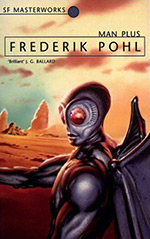
![]() justifiedsinner
justifiedsinner
6/21/2012
![]()
This 1976 novel is set in the not too distant future, the date is not specified but 2025 seems about right. The US-Soviet conflict is continuing and on the verge of breaking out into full-scale nuclear war. Colonization of Mars is concluded to be the only hope for the survival of the human race but colonization is only possible by converting people into cyborgs. A human machine hybrid with very little human left (the procedure includes complete emasculation).
When the first candidate dies of sensory overload breezy, handsome Roger Torrance is picked to replace him and so by degrees we follow the removal of his various parts and their replacement with artificial ones. Roger is not too popular with his wife who is one of the leading scientists on the program.
The novel is told in the first person plural and we come to realize that the omniscient narrator is really the worldwide computer network that has recently become sentient. This is supposed to be the twist at the end of the novel but is obviously quite a while before that. The network has been guiding humanity to colonize space so that machine survival will be guaranteed.
The unusual point of view has the effect of distancing the reader from the action and also turning their plight into nothing more that a recounting of stupid human pet tricks. The last scene on Mars has some striking imagery and some genuine suspense but the rest of the book is like a satire of Gore Vidal but in this case Myra Breckenridge looks like bug-eyed bat with a mainframe strapped to its back.
Of course the politics is outdated but in 1976 no one could have foreseen that. I take more issue with the technology however. 1976 was the year before Apple, Tandy and Commodore released their ground breaking machines. Moore’s law was stated in 1965. Surely any reasonable extrapolation would have had the computers a little smaller than Pohl envisaged. Also 1976 was the year Genentech was founded and it was obvious than genetic engineering was going to be a major technological factor in the next 50 years. So why does the human modification program feel like something from a 1960’s Doctor Who episode.
This novel won the 1976 Nebula and was shortlisted for the following year’s Hugo, Campbell and Locus prizes. It has not dated well and does not have the humanity of his Heechee novels or of those he wrote with Cyril Kornbluth.